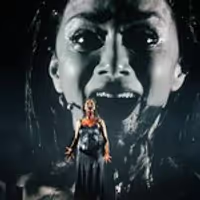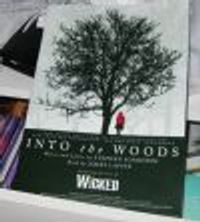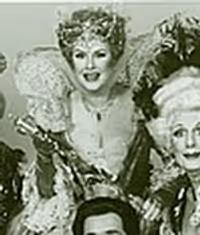I Feel Like Disney Might Not Do Shows On Broadway Anymore
#25I Feel Like Disney Might Not Do Shows On Broadway Anymore
Posted: 8/22/24 at 3:31pm
Theatrefanboy1 said: "We really missed out on them not bringing hunchback to Broadway that was an incredible production. I hope Hercules makes its way to Broadway as well as Pocahontas. My hope as well is that they start investing in first rate revivals of beauty and the beast and AiDa. As well as a reworking of Tarzan"
It feels like a lifetime ago, and I was still a teen, but I did see the original 1999 James Lapine (book and direction) version of Hunchback in Berlin and THAT was an incredible production, although I'm not sure if the technology would be as impressive now (I still wish I knew how Lapine got involved in the first place--he wasn't exactly known for massive, complex productions.) I don't think the Scott Schwartz production was nearly as good, nor was the new book although overall I think it was smart to just get rid of the Gargoyles (even if they were better used in Berlin than in the film.) Schwartz' background in "story theatre" sometimes I feel gets in the way of his productions (though his Hunchback worked much better than his Prince of Egypt.)
I could have this wrong, but it seems like Michael Eisner was the big champion of Hunchback at Disney (he also wanted a TV movie version of the musical) and with him gone Disney is happy enough to just leave it as a licensed property (although not that long ago it had a significant Japanese production.)
#26I Feel Like Disney Might Not Do Shows On Broadway Anymore
Posted: 8/22/24 at 3:34pm
joevitus said: "Do producersreally fear critics anymore? That seems like an outmoded form of communication. Pull quotes for ads are great, and of course any positive word helps generate buzz. Tony awards are something to brag about. But the days when critics made or broke a show seem to me long gone."
I think it completely depends on the type of show it is. But certainly for the kinds of musicals Disney does, I don't think critics are all that important (and while not Disney, it feels like this *really* started to change with Wicked being a quick blockbuster despite reviews, even if there are earlier examples--like how Les Miz initially got across the board bad reviews in London.)
#27I Feel Like Disney Might Not Do Shows On Broadway Anymore
Posted: 8/22/24 at 3:43pm
so not true as I have a friend that works for disney theatricals and they do have plans for future musicals on broadway
#28I Feel Like Disney Might Not Do Shows On Broadway Anymore
Posted: 8/22/24 at 4:13pm
Falsettolands said: " The shows of theirs that didn't turn a profit initially have almost always had a return investment somewhere down the line (removing Tarzan from the equation)"
You know the new production of Tarzan they did for Germany ran in Hamburg from October 2008 to June 2013 (and the same staging but different production also ran in the Netherlands from 2007-2009 for two and a half years.) So I'm not sure Tarzan does have to be removed from that equation https://ovrtur.com/production/2903495
Falsettolands
Broadway Star Joined: 11/18/13
#29I Feel Like Disney Might Not Do Shows On Broadway Anymore
Posted: 8/22/24 at 4:31pm
EricMontreal22 said: "Falsettolands said: " The shows of theirs that didn't turn a profit initially have almost always had a return investment somewhere down the line (removing Tarzan from the equation)"
You know the new production of Tarzan they did for Germany ran in Hamburg from October 2008 to June 2013 (and the same staging but different production also ran in the Netherlands from 2007-2009 for two and a half years.) So I'm not sure Tarzan does have to be removed from that equation https://ovrtur.com/production/2903495
"
I am aware of that fact and I stand by what I said- there is a different licensing agreement altogether for international productions.
verywellthensigh
Broadway Star Joined: 6/14/22
#30I Feel Like Disney Might Not Do Shows On Broadway Anymore
Posted: 8/22/24 at 5:02pm
No more Disney adaptations?
Oh, no. However will we cope?
#31I Feel Like Disney Might Not Do Shows On Broadway Anymore
Posted: 8/22/24 at 5:38pm
EricMontreal22 said: "joevitus said: "Do producersreally fear critics anymore? That seems like an outmoded form of communication. Pull quotes for ads are great, and of course any positive word helps generate buzz. Tony awards are something to brag about. But the days when critics made or broke a show seem to me long gone."
I think it completely depends on the type of show it is. But certainly for the kinds of musicals Disney does, I don't think critics are all that important (and while not Disney, it feels like this *really* started to change with Wicked being a quick blockbuster despite reviews, even if there are earlier examples--like how Les Miz initially got across the board bad reviews in London.)
"
Goes back even further than that. Lloyd Webber's shows have almost always gotten overwhelmingly bad reviews. Oddly, Frank Rich, who really really hated his stuff, gave a grudgingly positive review to Cats.
#32I Feel Like Disney Might Not Do Shows On Broadway Anymore
Posted: 8/22/24 at 6:07pm
I was wondering if I'd count ALW but I would obnoxiously argue his biggest Broadway hits didn't get terrible reviews. Frank Rich also basically recommended Phantom albeit for the experience and stage craft:
"
IT may be possible to have a terrible time at ''The Phantom of the Opera,'' but you'll have to work at it. Only a terminal prig would let the avalanche of pre-opening publicity poison his enjoyment of this show, which usually wants nothing more than to shower the audience with fantasy and fun, and which often succeeds, at any price.
It would be equally ludicrous, however - and an invitation to severe disappointment - to let the hype kindle the hope that ''Phantom'' is a credible heir to the Rodgers and Hammerstein musicals that haunt both Andrew Lloyd Webber's creative aspirations and the Majestic Theater as persistently as the evening's title character does. What one finds instead is a characteristic Lloyd Webber project - long on pop professionalism and melody, impoverished of artistic personality and passion - that the director Harold Prince, the designer Maria Bjornson and the mesmerizing actor Michael Crawford have elevated quite literally to the roof. ''The Phantom of the Opera'' is as much a victory of dynamic stagecraft over musical kitsch as it is a triumph of merchandising uber alles."
Certainly not a review that would turn most people away IMHO, or at least anyone who had an inkling of a desire to see it. On the other hand, unlike in London where it got good reviews (as ALW shows traditionally used to,) and ran for 3+ years, Aspects of Love basically died after its record breaking advance and became the biggest Broadway money loser up to that point, and I think that DID have a lot to do with the reviews.
So, while I see your point, I'd argue that those most successful 1980s megamusicals on Broadway (Frank Rich gave what was basically a rave, by his standards, to Miss Saigon) all got decent to good reviews from the major critics.
Chip27
Swing Joined: 8/20/24
#33I Feel Like Disney Might Not Do Shows On Broadway Anymore
Posted: 8/22/24 at 8:28pm
verywellthensigh said: "No more Disney adaptations?
Oh, no. However will we cope?"
I'm just jumping to conclusions with my weird doom and gloom moment. Please, don't take it too seriously. I need to close this thread and not comeback. Thank goodness this is is my only thread.
#34I Feel Like Disney Might Not Do Shows On Broadway Anymore
Posted: 8/22/24 at 8:42pm
People often blame Scott Schwartz for the Schwartz men’s descent into story theatre as cliche, but… his dad is Stephen Schwartz. The composer of Godspell and Pippin, probably the two most mainstream popular works to ever use story theatre as a backbone.
Hell, before its Broadway premiere, Wicked was story theatre rooted in LA.
#35I Feel Like Disney Might Not Do Shows On Broadway Anymore
Posted: 8/22/24 at 9:51pm
darquegk said: "People often blame Scott Schwartz for the Schwartz men’s descent into story theatre as cliche, but… his dad is Stephen Schwartz. The composer of Godspell and Pippin, probably the two most mainstream popular works to ever use story theatre as a backbone.
Hell, before its Broadway premiere, Wicked was story theatre rooted in LA."
Touche and this is completely true. Which is why when it's doubled down with Scott directing his dad's stuff it's particularly--well not to my liking. (I didn't see Scott's Godspell, but I think it's fair to say that Godspell does welcome that approach. Otherwise...)
#36I Feel Like Disney Might Not Do Shows On Broadway Anymore
Posted: 8/22/24 at 10:10pm
For me the only thing I wished for was a transfer of the German Hunchback, while I enjoyed the La Jola production it is sadly flawed with all the overdone narrative and changed lyrics. I’m still at loss on why Lion King became the juggernaut it did, apart from the stunning opening sequence every thing that’s follows is sadly stop start dull!
#37I Feel Like Disney Might Not Do Shows On Broadway Anymore
Posted: 8/23/24 at 12:58am
What is story theater?
#38I Feel Like Disney Might Not Do Shows On Broadway Anymore
Posted: 8/23/24 at 9:54am
MagicalMusical said: "What is story theater?"
Look up Paul Sills and Story Theatre. Lots of info out there about both.
#39I Feel Like Disney Might Not Do Shows On Broadway Anymore
Posted: 8/23/24 at 10:45am
MagicalMusical said: "What is story theater?"
As Dramamama611 says, it grew out of a production called Paul Sills' Story Theatre. The "story theatre" name has since gone on to be used to describe productions that resemble the style of that production.
Generally, it's used to describe shows/productions that are typically based on fairy or folk tales, myths, or legends and have a loose, improvisational feel. There tends to be no fourth wall and they lean into the idea that you are seeing a troupe of actors putting on a show. There is usually direct narration to the audience by the company, there is usually a scrappy or DIY-quality to the production and there is a very heightened sense of theatricality. They also tend to blur the lines between musicals and plays. It's most commonly associated with theatre for young audiences but there are some notable larger productions (Peter and the Starcatcher is probably the best recent example of this style).
When done well, it can be a magical and very fun example of how theatre can capture the imagination to create new worlds from very little. When done poorly, it's a cloying example of theatre kid try-hard.
#40I Feel Like Disney Might Not Do Shows On Broadway Anymore
Posted: 8/23/24 at 11:42am
Sounds a lot like panto. Is that an apt comparison?
#41I Feel Like Disney Might Not Do Shows On Broadway Anymore
Posted: 8/23/24 at 1:51pm
TheQuibbler said: "Sounds a lot like panto. Is that an apt comparison?"
I would say story theatre is usually less irreverent and more barebones in terms of design than panto- the emphasis is really on whimsy and audience imagination, not so much comedy necessarily- but they're in the same world.
#42I Feel Like Disney Might Not Do Shows On Broadway Anymore
Posted: 8/24/24 at 12:51am
Thank you, dramamama611 and Kad. That was perfectly helpful.
#43I Feel Like Disney Might Not Do Shows On Broadway Anymore
Posted: 8/24/24 at 12:42pm
Our pleasure (Sorry for speaking for you, Kad.)
Done well, Story Theater is delightful. Done poorly? Yikes.
Videos









